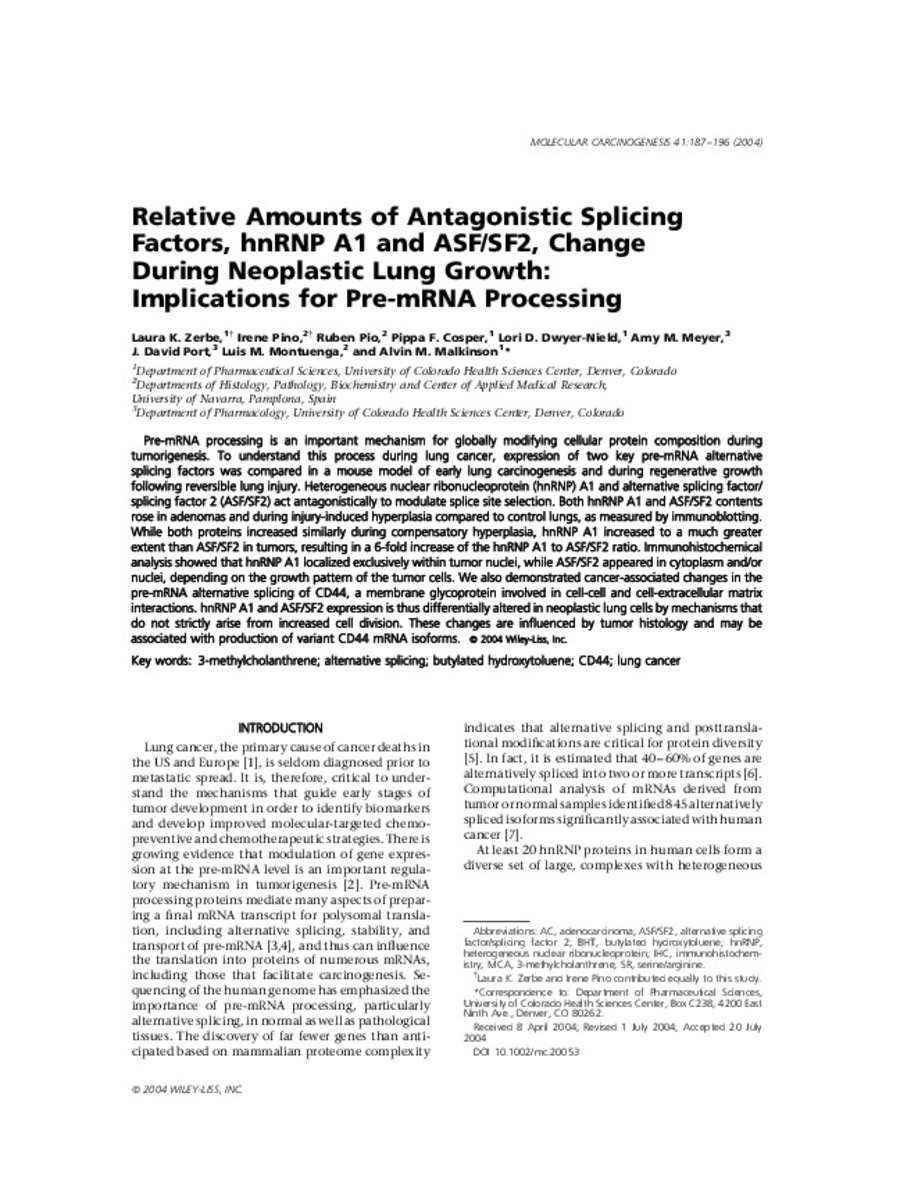Full metadata record
| DC Field | Value | Language |
|---|---|---|
| dc.creator | Zerbe, L.K. (Laura K.) | |
| dc.creator | Pino, I. (Irene) | |
| dc.creator | Pio, R. (Rubén) | |
| dc.creator | Cosper, P. (P.F.) | |
| dc.creator | Dwyer-Nield, L. (L.D.) | |
| dc.creator | Meyer, A.M. (Amy M.) | |
| dc.creator | Port, J.D. (J. David) | |
| dc.creator | Montuenga-Badia, L.M. (Luis M.) | |
| dc.creator | Malkinson, A.M. (Alvin M.) | |
| dc.date.accessioned | 2011-08-19T10:41:57Z | - |
| dc.date.available | 2011-08-19T10:41:57Z | - |
| dc.date.issued | 2004 | - |
| dc.identifier.citation | Zerbe LK, Pino I, Pio R, Cosper PF, Dwyer-Nield LD, Meyer AM, et al. Relative amounts of antagonistic splicing factors, hnRNP A1 and ASF/SF2, change during neoplastic lung growth: implications for pre-mRNA processing. Mol Carcinog 2004 Dec;41(4):187-196. | es_ES |
| dc.identifier.issn | 1098-2744 | - |
| dc.identifier.uri | https://hdl.handle.net/10171/18806 | - |
| dc.description.abstract | Pre-mRNA processing is an important mechanism for globally modifying cellular protein composition during tumorigenesis. To understand this process during lung cancer, expression of two key pre-mRNA alternative splicing factors was compared in a mouse model of early lung carcinogenesis and during regenerative growth following reversible lung injury. Heterogeneous nuclear ribonucleoprotein (hnRNP) A1 and alternative splicing factor/splicing factor 2 (ASF/SF2) act antagonistically to modulate splice site selection. Both hnRNP A1 and ASF/SF2 contents rose in adenomas and during injury-induced hyperplasia compared to control lungs, as measured by immunoblotting. While both proteins increased similarly during compensatory hyperplasia, hnRNP A1 increased to a much greater extent than ASF/SF2 in tumors, resulting in a 6-fold increase of the hnRNP A1 to ASF/SF2 ratio. Immunohistochemical analysis showed that hnRNP A1 localized exclusively within tumor nuclei, while ASF/SF2 appeared in cytoplasm and/or nuclei, depending on the growth pattern of the tumor cells. We also demonstrated cancer-associated changes in the pre-mRNA alternative splicing of CD44, a membrane glycoprotein involved in cell-cell and cell-extracellular matrix interactions. hnRNP A1 and ASF/SF2 expression is thus differentially altered in neoplastic lung cells by mechanisms that do not strictly arise from increased cell division. These changes are influenced by tumor histology and may be associated with production of variant CD44 mRNA isoforms. | es_ES |
| dc.language.iso | eng | es_ES |
| dc.publisher | Wiley-Blackwell | es_ES |
| dc.rights | info:eu-repo/semantics/openAccess | es_ES |
| dc.subject | 3-methylcholanthrene | es_ES |
| dc.subject | Alternative splicing | es_ES |
| dc.subject | Butylated hydroxytoluene | es_ES |
| dc.subject | CD44 | es_ES |
| dc.subject | Lung cancer | es_ES |
| dc.title | Relative amounts of antagonistic splicing factors, hnRNP A1 and ASF/SF2, change during neoplastic lung growth: implications for pre-mRNA processing | es_ES |
| dc.type | info:eu-repo/semantics/article | es_ES |
| dc.relation.publisherversion | http://onlinelibrary.wiley.com/doi/10.1002/mc.20053/abstract | es_ES |
Files in This Item:
Statistics and impact
Items in Dadun are protected by copyright, with all rights reserved, unless otherwise indicated.






